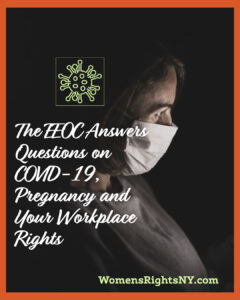By Jack Tuckner, Esq.
On March 27, 2020, the United States Equal Employment Opportunity Commission (“EEOC”) answered questions related to the intersection of COVID-19, pregnancy and the workplace, among other workplace questions. The full Q&A session may be seen below –
The first pregnancy-related question the EEOC answered was Question 13:
The CDC list of people who are at higher risk for severe illness if they contract COVID-19 includes a recommendation to monitor women who are pregnant. Based on this CDC recommendation may an employer decide to layoff or place on furlough a woman who is pregnant but does not have COVID-19, or symptoms associated with the disease.
The answer is a definite no.
Pregnant employees are protected under the federal Civil Rights Act (Title VII”), which prohibits discrimination based on sex, and the Pregnancy Discrimination Act (“PDA”) which prohibits discrimination based on pregnancy. Therefore, pregnancy discrimination is also sex discrimination, and employment decisions may not be based on pregnancy or sex.
The second pregnancy-related question the EEOC answered was Question 14:
Conversely, do the EEO laws require an employer to grant a request to telework from an employee who is pregnant because the CDC says there is a higher risk if she contracts COVID-19?
The answer is (essentially) yes.

Title VII, as amended by the PDA, states that women affected by pregnancy or related conditions must be treated in the same manner as other employees who are “similar in their ability or inability to work.”
So, a pregnant employee should not be denied a needed adjustment that the employer provides to other employees for other reasons, but who are similar in their ability or inability to work.
In plain English, if your employer grants work adjustments to accommodate other non-pregnant employees who are sick, injured, or temporarily disabled for any other reason (they do), then your employer must be flexible with you, too, for your pregnancy-based challenges.
The EEOC attorney then goes on to note that pregnancy-related medical conditions can sometimes be covered by the Americans with Disability Act (“ADA”), which would trigger accommodation rights under the ADA, but that pregnancy itself is not an ADA-disability.
Author’s comment:
Under the Americans with Disabilities Amendments Act of 2008 (ADAAA), the ADA was substantially broadened to cover accommodation requests of pregnant women, as pregnancy-related conditions or impairments that “substantially limit a major life activity” are now considered disabilities.
So, for example, pregnancy-related sciatica, anemia, preeclampsia, and gestational diabetes, would all be covered under the ADAAA, but so would pregnancy-based insomnia, orthopedic problems and severe anxiety caused by your pregnancy in this unprecedented time of the coronavirus, if that emotional turmoil “substantially limits a major life activity,” such as sleeping, walking, eating, etc. Under the circumstances, that’s sort of a no-brainer, right?
As pregnancy is itself a temporary condition, these “disabilities” will generally cease once your baby is born, so it is not difficult to meet the burden required for an accommodation if your medical provider writes a letter on your behalf documenting your pregnancy-related difficulties, even if the “pregnancy-based medical condition” is as common as severe morning sickness.
If you’re having difficulties at work caused by your pregnancy, maternity leave or postpartum workplace issues and want to consult with Jack Tuckner, please contact him or Deborah O’Rell, or visit our website, blog or YouTube channel for additional pregnancy discrimination information. We remain open will promptly schedule a phone or teleconference consultation.